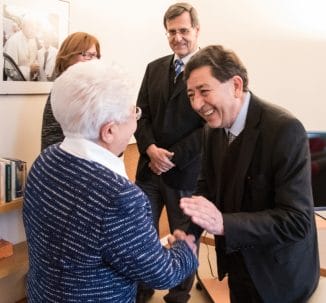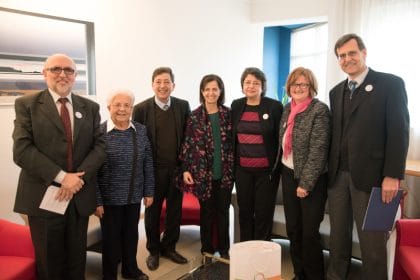 Khaled Bentounès, Sufi Master of the Alâwiiya, an Algerian born in 1949, is a man of peace. Living in France since the 1960s, he was behind many useful and worthwhile projects: from founding the Muslim Scouts of France, to l‘association Terres d’Europe; from the international talks at UNESCO for an Islam of peace, to the Alawaiya International Sufi Association which he founded, and an international mobilising campaign that the United Nations would institute a World LiveTogether Day. On February 26th, he visited the Focolare’s International Centre where he had a conversation with Focolare president, Maria Voce, and co-president Jesús Morán. During the course of the visit we had the opportunity to ask him a few questions. The first question was about his many projects over the years and now: “To give a quick answer to your question, I’m working on converting myself to the vision of a more fraternal world, more harmonious, a more just world. I work for this ‘circle’ of brotherhood, that I might see it before leaving this world, that I might see fulfilled the dream of a large portion of humanity. I don’t know if I’ll ever see it, but at least I have the assurance that I made a contribution.” When asked about the reasons for his hope in a time when brotherhood amongst peoples does not seem to have a place, Khaled Bentounès said that he found reasons to hope “first of all in the rich spritual legacy he received from his ancestors, for whom fraternity was inescapable. When I look at where I come from, I see but one uninterrupted line. “I happen to meet people involved in politics or the economy who describe a world heading to insoluble problems, and I say to them what our Masters say to us: ‘If they tell you that the world will end tomorrow, what should you do? Continue with your sowing and planting! Don’t worry too much!” So, we do what we have to do! We plant and we sow love, hope and brotherhood – whatever comes! Even if the end of the world will come tomorrow, as long as there is a minute left, you need to use it. Perhaps tomorrow will be another day, another world. And persevere!” Khaled Bentounès, who in 1986 had attended the meeting in Assisi with John Paul II and other religious leaders of the world, also has a knowledge of the Focolare that goes back to a meeting he had with Chiara Lubich in the 1980s. The relationship continued in France, up to his recent collaboration in assigning of the 2015 Chiara Lubich Fraternity Prize to the Vivre ensemble à Cannes Association which he promotes.
Khaled Bentounès, Sufi Master of the Alâwiiya, an Algerian born in 1949, is a man of peace. Living in France since the 1960s, he was behind many useful and worthwhile projects: from founding the Muslim Scouts of France, to l‘association Terres d’Europe; from the international talks at UNESCO for an Islam of peace, to the Alawaiya International Sufi Association which he founded, and an international mobilising campaign that the United Nations would institute a World LiveTogether Day. On February 26th, he visited the Focolare’s International Centre where he had a conversation with Focolare president, Maria Voce, and co-president Jesús Morán. During the course of the visit we had the opportunity to ask him a few questions. The first question was about his many projects over the years and now: “To give a quick answer to your question, I’m working on converting myself to the vision of a more fraternal world, more harmonious, a more just world. I work for this ‘circle’ of brotherhood, that I might see it before leaving this world, that I might see fulfilled the dream of a large portion of humanity. I don’t know if I’ll ever see it, but at least I have the assurance that I made a contribution.” When asked about the reasons for his hope in a time when brotherhood amongst peoples does not seem to have a place, Khaled Bentounès said that he found reasons to hope “first of all in the rich spritual legacy he received from his ancestors, for whom fraternity was inescapable. When I look at where I come from, I see but one uninterrupted line. “I happen to meet people involved in politics or the economy who describe a world heading to insoluble problems, and I say to them what our Masters say to us: ‘If they tell you that the world will end tomorrow, what should you do? Continue with your sowing and planting! Don’t worry too much!” So, we do what we have to do! We plant and we sow love, hope and brotherhood – whatever comes! Even if the end of the world will come tomorrow, as long as there is a minute left, you need to use it. Perhaps tomorrow will be another day, another world. And persevere!” Khaled Bentounès, who in 1986 had attended the meeting in Assisi with John Paul II and other religious leaders of the world, also has a knowledge of the Focolare that goes back to a meeting he had with Chiara Lubich in the 1980s. The relationship continued in France, up to his recent collaboration in assigning of the 2015 Chiara Lubich Fraternity Prize to the Vivre ensemble à Cannes Association which he promotes.  What is your relationship with the Focolare today? What are the common ideals? The sheikh responds: “I think that time has made this relationship fertile, and today’s meeting is also a fruit of the past. The friendship has remained constant. My presence here today in the International Centre and the meeting with the president, Maria Voce and with the co-president shows that it continues. We spoke about mutual trust, about the project of bringing forward a more fraternal vision of the world around us; about how Christian and Muslim spiritual movements can operate to offer their witness to those who wish to listen to them. We do not pretend to change the world alone, but it is a fact that there are links amongst different religious traditions that must be strengthened, so that we can walk together towards a common future that must be built each of us with the other, and not against the other.” He concluded the interview by sharing a dream: “There are science academies, mathematics academies, philosophy and military academies – and there are no peace academies. Why? Spiritual effort is not enough. We need to teach it. Peace is not something that descends from heaven, it is something around which you ‘work’. It is an existential state, a vision of the world, a behaviour. There is economic peace, there is social peace, there is political peace. Peace regards everything. Ecology is a form of peace with nature. We need to learn how you make peace. I have this project at heart! How do we link peace and art, peace and architecture? Can peace be transmitted to the future generations through art? How could we, through a solid economy, create knowledge sharing and wealth sharing in a way that is just, beyond land or country? This is a sacrosanct ‘work in progress’! This academy is not just a word, it is a concrete task that must accompany our efforts in every field.” He concluded: “I think this is our spirituality, which feeds the conscience to go farther, and to include everyone.”
What is your relationship with the Focolare today? What are the common ideals? The sheikh responds: “I think that time has made this relationship fertile, and today’s meeting is also a fruit of the past. The friendship has remained constant. My presence here today in the International Centre and the meeting with the president, Maria Voce and with the co-president shows that it continues. We spoke about mutual trust, about the project of bringing forward a more fraternal vision of the world around us; about how Christian and Muslim spiritual movements can operate to offer their witness to those who wish to listen to them. We do not pretend to change the world alone, but it is a fact that there are links amongst different religious traditions that must be strengthened, so that we can walk together towards a common future that must be built each of us with the other, and not against the other.” He concluded the interview by sharing a dream: “There are science academies, mathematics academies, philosophy and military academies – and there are no peace academies. Why? Spiritual effort is not enough. We need to teach it. Peace is not something that descends from heaven, it is something around which you ‘work’. It is an existential state, a vision of the world, a behaviour. There is economic peace, there is social peace, there is political peace. Peace regards everything. Ecology is a form of peace with nature. We need to learn how you make peace. I have this project at heart! How do we link peace and art, peace and architecture? Can peace be transmitted to the future generations through art? How could we, through a solid economy, create knowledge sharing and wealth sharing in a way that is just, beyond land or country? This is a sacrosanct ‘work in progress’! This academy is not just a word, it is a concrete task that must accompany our efforts in every field.” He concluded: “I think this is our spirituality, which feeds the conscience to go farther, and to include everyone.”
Put love into practice
Put love into practice




0 Comments